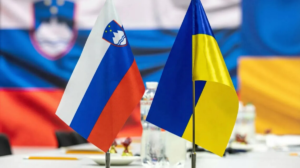
The Slovenian Ministry of Foreign Affairs has announced the allocation of EUR 500,000 to support Ukraine’s energy sector.
“Slovenia has reaffirmed its solidarity with Ukraine, which is experiencing its worst energy crisis since the start of the war. We will add EUR 500,000 to support Ukraine’s energy sector,” the ministry said in a statement on social media on Friday.
The country’s Foreign Ministry also reports that since the beginning of Russian aggression, Slovenia has already allocated EUR 61 million to help Ukraine.

Slovenia’s real estate market continues to show strong demand, with a steady presence of foreign buyers, particularly from neighboring EU countries. Although the country’s property sector is smaller and more regulated than those of Croatia or Montenegro, Slovenia remains one of the most attractive investment destinations in Central Europe — offering political stability, EU membership, and a balance between Alpine lifestyle and Mediterranean proximity.
According to data from Slovenia’s Geodetic Administration and industry analysts for early 2025, around 6–7% of all real estate transactions in the country involve foreign citizens — a figure that has remained stable over the past three years.
Among foreign buyers, the leading nationalities are:
1) Austria – approximately 28% of transactions involving foreigners;
2) Germany – around 22%;
3) Italy – roughly 14%, mainly in the coastal Primorska region;
4) Croatia – about 8%, driven by cross-border purchases in the northeast;
5) Hungary and Switzerland – jointly accounting for about 10%.
Buyers from outside the EU (including the U.K., Israel, and the United States) represent a smaller but growing segment, often focusing on luxury mountain properties in Bled, Bohinj, and Kranjska Gora, or on historic residences in Ljubljana’s old town.
The Slovenian real estate market continues to experience price growth, albeit at a more moderate pace compared to its peak years. In 2024, average residential prices increased by 6.8%, while in Ljubljana — by over 10%. Newly built apartments and energy-efficient houses remain the most sought-after properties, while older buildings without renovation are less competitive.
Despite strong fundamentals, experts expect foreign share in property transactions to remain around 6–7%.
At the same time, rising connectivity with Austria, Italy, and Croatia — including through new rail and road infrastructure — is expected to stimulate cross-border investment and second-home demand.
In the medium term, Slovenia’s property market is likely to remain stable but competitive, with local and EU buyers dominating, and luxury and eco-friendly segments gaining ground.
Slovenia’s real estate sector combines European stability with regional charm. Foreign investors, particularly from Austria, Germany, and Italy, continue to view the country as a safe, high-quality destination for second homes and long-term investment — though affordability and supply remain key constraints.
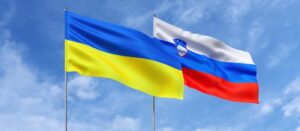
Most Ukrainians have a positive attitude toward Slovenia, according to the results of a survey conducted by Active Group and Experts Club in August 2025.
According to the data, 52.8% of respondents expressed a positive attitude towards this country (20.5% — mostly positive, 32.3% — completely positive). Only 9.0% of respondents had a negative attitude (7.0% — mostly negative, 2.0% — completely negative). At the same time, 38.2% of citizens expressed a neutral position, while another 5.3% admitted that they knew little about Slovenia.
“The survey results show that Ukrainians perceive Slovenia as a friendly European country that consistently supports Ukraine in international organizations and promotes European integration. The high level of positive attitudes reflects both cultural proximity and shared European values,” said Active Group CEO Oleksandr Pozniy.
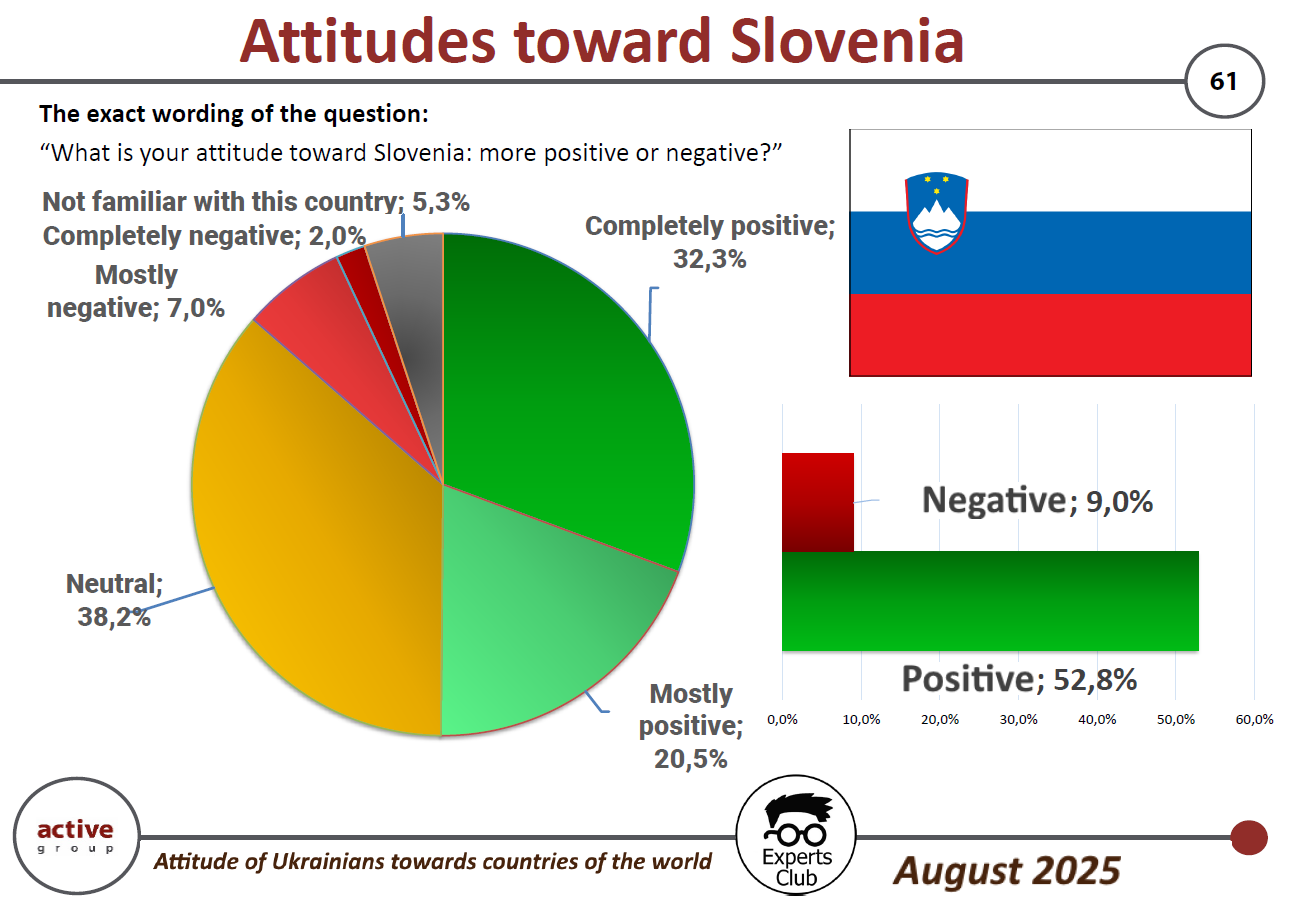
In turn, co-founder of Experts Club Maksym Urakin emphasized the economic aspect:
“In 2025, the total trade volume between Ukraine and Slovenia reached $181.5 million. Ukrainian exports amounted to $45.3 million, while imports exceeded $136 million, resulting in a negative balance of $90.8 million. This indicates that there is significant potential for growth in Ukrainian exports to Slovenia, especially in the areas of agricultural products and mechanical engineering,” he said.
The study is part of a large-scale project by Active Group and Experts Club to study Ukrainians’ international sympathies and the dynamics of foreign economic relations.
ACTIVE GROUP, EXPERTS CLUB, Pozniy, RELATIONS, SLOVENIA, SOCIOLOGY, TRADE, UKRAINE, URAKIN
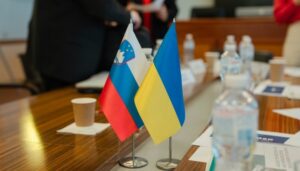
Deputy Prime Minister for Recovery of Ukraine, Minister of Community and Territorial Development Oleksii Kuleba has agreed with Slovenian Finance Minister Klemen Boštjančič on a number of new projects to rebuild frontline regions.
“We have agreed on new projects in the areas of water supply, energy efficiency, and municipal infrastructure for frontline regions,” Kuleba wrote on Telegram on Saturday.
The deputy prime minister noted that they also discussed developing cooperation in rebuilding and supporting communities, attracting Slovenian businesses to Ukrainian projects, and strengthening technical cooperation between institutions in both countries.
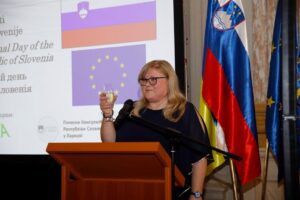
A solemn diplomatic reception was held in Kyiv on the occasion of the 34th anniversary of the declaration of independence of the Republic of Slovenia. The event brought together representatives of the Ukrainian government, diplomatic corps, the public and businesses operating in Ukraine. The Ambassador Extraordinary and Plenipotentiary of the Republic of Slovenia to Ukraine, Ms. Mateja Prevolšek, delivered a speech.
In her address, the Ambassador emphasized the commonality of the historical challenges that Slovenia and Ukraine have faced in their struggle for independence, democracy and national identity.
“Slovenia is celebrating its 34th birthday. At the same time, Ukraine gained its independence, because it was an era full of changes, new ideas and hopes for freedom, democracy and economic development,” Mateja Prevolšek said.
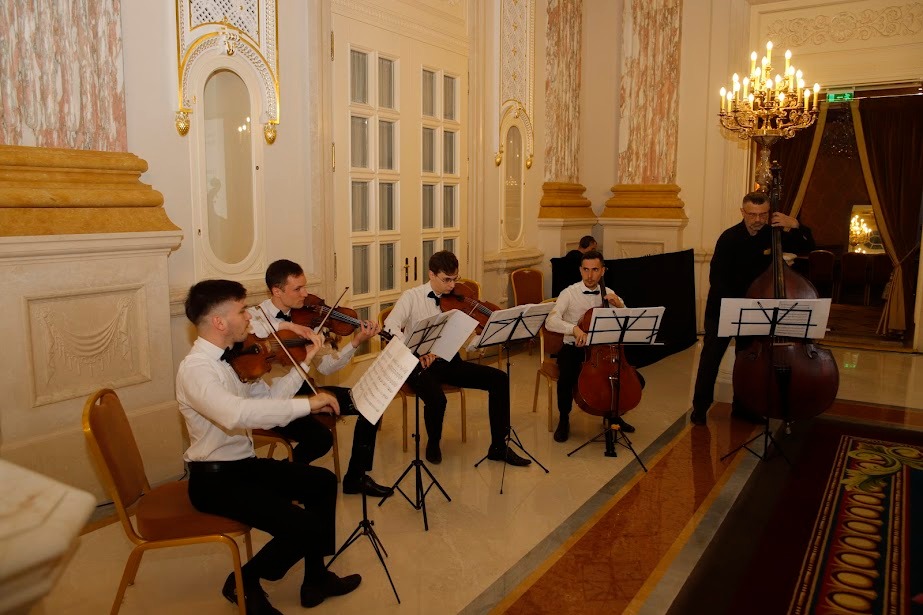
She emphasized that despite the obvious geographical and demographic differences, the two countries have been maintaining close partnerships for over 30 years. According to her, Slovenia is firmly committed to supporting Ukraine’s European course and its struggle for freedom.
“I have had and have the opportunity to see the courage of the Ukrainian people, their desire for a better future in their own country, visiting many Ukrainian regions, cities and villages to support projects within the framework of Slovenian development cooperation and humanitarian aid,” the diplomat added.
Slovenia supports a number of initiatives in Ukraine, including rehabilitation of veterans, training of psychologists and teachers to work with traumatized children, and cooperation between Ukrainian and Slovenian municipalities.
The guests were especially warm when the Ambassador told them about her personal decision to learn Ukrainian. She emphasized the importance of preserving linguistic identity for both Slovenes and Ukrainians.
“It was a very good decision, because I will not only learn the melodiousness of your language, but I will also be able to communicate with people and better understand their feelings,” Ms. Prevolšek emphasized.
At the end of her speech, the Ambassador expressed her gratitude to all Slovenian companies operating in Ukraine that contributed to the organization of the reception, as well as to the diplomatic team and her husband for their support.
The reception ended with the traditional raising of glasses in honor of the friendship between Slovenia and Ukraine, which, according to the Ambassador, “was born out of a difficult past, but is confidently moving towards a common future.”
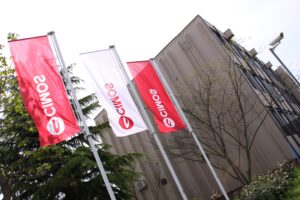
The Slovenian industrial giant Cimos, known in the former Federal Republic of Yugoslavia for the production of Citroën cars, plans to close its plant in Slovenia and move production to Serbia and Bosnia and Herzegovina. According to Dnevnik, a layoff program has been prepared that does not suit the representatives of the Union of Employees of the Metallurgical and Electrical Industry of Slovenia (SKEI) for the Kras and Primorska and Primorska regions.
According to Saša Ristić, the program was recognized as unprofessional because it did not specify the specific positions that would be retained. He noted that this is the worst layoff program he has ever seen.
Cimos has long been planning to move production to Gradac (Bosnia and Herzegovina) and Kikinda (Serbia). However, according to Ristić, this move is controversial because management should have first informed the works council, which did not happen, although the relocation of production is the official reason for the layoffs.
Cimos has had a plant in Hradac for many years. Ristić explained that the upcoming layoffs are also related to the planned relocation of production. He told Dnevnik that the Cimos management requires the trade union and the works council to give their urgent consent to the dismissals.
Of the 175 employees to be laid off, about 120 work in Senožec, while the rest are employed at Cimos’ production sites in Maribor and Vuzenice.
About Cimos
Cimos is a Slovenian company specializing in the production of components for the automotive industry. In 2020, the company was acquired by the German investment fund Mutares.
Financial results
As of 2022, Cimos’s revenue amounted to about 200 million euros. The company continues to work on improving efficiency and expanding production capacity.
Products and customers
Cimos produces a variety of components for the automotive industry, including braking systems, suspensions, and powertrains. The company’s customers include automakers such as Renault, PSA Group and Volkswagen.
Exports.
Cimos products are exported to various European countries, including Germany, France, and Italy.
Source: https://t.me/relocationrs/606